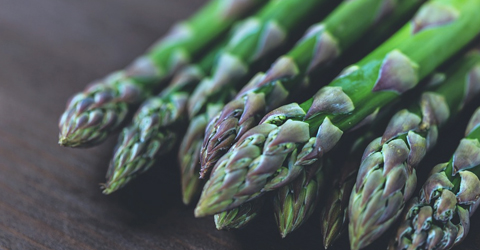

Authorities on health and nutrition consistently regard vegetables as one of the healthiest foods. However, recently a compound in asparagus and some other foods, called asparagine, was linked to breast cancer. Some media outlets were quick to highlight the potential danger with headlines like, “Asparagus Could Kill Me?” and “Amino Acid in Asparagus May Cause Breast Cancer.” Should we listen to the headlines and immediately cut asparagus and similar food from our diet?
The simple answer is no. The complicated answer leads us to question what the research actually involved and what the results actually mean, as opposed to listening to sensationalist headlines.
The research involved mice and an amino acid derivative called asparagine. As the name suggests, asparagine is found in asparagus as well as other vegetables, potatoes, certain meats and dairy products. Asparagine is a non-essential amino acid. This means that if humans do not consume any asparagine, our bodies will still naturally make it using an enzyme called asparagine synthetase.
The current research was conducted by scientists from the Cancer Research UK Cancer Institute in Cambridge, UK as well as American and Canadian colleagues and was published in the highly prestigious scientific journal Nature.[1] The research involved mice with an aggressive form of breast cancer.
Even if we cut down on the amount of asparagine we eat, our bodies can still make it.
The researchers noted that a diet high in asparagine seemed to cause breast cancer to spread (metastasize) to other tissues in the mice. In an additional part of the study, asparagine was restricted, through the use of an drug which blocks asparagine synthetase (the enzyme which produces asparagine inside the body) and also with a low asparagine diet. Decreasing asparagine limited the spread (or metastasis) of breast cancer in the mice. The researchers then examined human records and found that breast tumours producing the most asparagine were more likely to spread.
Before we cut asparagus from out diet, consider these points regarding the actual study:
1. This study was conducted in mice with breast cancer, not humans. Indeed, the lead researcher noted: “But of course, until human studies are done, this isn’t a DIY method to prevent cancer.”
2. Although in the current study the researchers noted that human breast tumors producing the most asparagine were more likely to spread, they did not evaluate the effect of dietary asparagine, which is completely separate from what the body produces.
3. Reducing asparagine in mice seemed to slow the spread of breast cancer but did not seem to affect risk of breast cancer in the first place.
4. There are many dietary sources of asparagine including animal-based (beef, poultry, eggs, seafood) and plant-based (asparagus, other vegetables, potatoes, nuts, legumes, soy) Therefore, restricting vegetables or asparagus alone may not decrease consumption of asparagine.
5. Even if we cut down on the amount of asparagine we eat, our bodies can still make it.
6. The current study used a very high dose of asparagine. The researchers compared a diet containing 4% asparagine to a diet containing no asparagine. If a human ate nothing but asparagus, their diet would still only be 0.6% asparagine. I don’t know if it’s possible for a human to consume a natural diet containing either a very high amount of asparagine (4%) or a very low amount (0%).
Let us also consider these points regarding asparagus:
1. Asparagus is naturally low in calories and fat but high in fiber and many micronutrients including vitamins (especially vitamin K and vitamin C), minerals (especially manganese and selenium) and other phytochemicals.
2. I am not aware of any research in humans suggesting that asparagus contributes to cancer initiation and spread.
3. I am aware of research using animal models which show that asparagus decreases cancer risk or severity. In fact as far back as 1981, there were publications detailing a protective effect of asparagus against breast cancer in rats.[2] Subsequent research suggested similar protective effects against liver cancer,[3] stomach cancer,[4] and skin cancer.[4]
4. I am aware of research using human cancer cells which shows that asparagus has anti-cancer effects on colon cancer cells,[5] kidney cancer cells,[6] and most recently (2018) liver cancer cells,[7-11] breast cancer cells,[11] and bladder cancer cells.[11]
5. These anti-cancer effects of asparagus seem to be due to the presence of multiple components, including steroidal constituents, such as sarsasapogenin and diosgenin,[5] asparanins,[8] saponins,[12][13] cochinchinensis, adscendens, shatavarins,[14] and various acetylenic compounds.
Dietary asparagine, seemingly from any source, can form acrylamides under high heat cooking such as frying. Therefore, fried meat and potatoes (chips, fries, etc.) likely represent the real danger regarding asparagine. In fact, the study briefly discussed above was reported very differently by different media outlets, with some reading: “Eating Meat and Potatoes Linked to Spread of Cancer in Mice’’ and “Eating Meat and Fish ‘Adds More Fire’ to Breast Cancer.” So steamed asparagus is fine, but fried meats not so much.
Asparagus, like other fruits and vegetables is a very healthy choice and can be a great addition to a varied diet. The recent headlines surrounding asparagus are clearly overblown. Regarding this recent mouse study, Baroness Delyth Morgan, chief executive of Breast Cancer Now, stated, “We’d also encourage all patients to follow a healthy and varied diet—rich in fruit, vegetables, and pulses, and limited in processed meat and high fat or sugar foods—to help give them the best chance of survival.”
There should not be a fuss about asparagus.
Copyright 2024 Center for Nutrition Studies. All rights reserved.